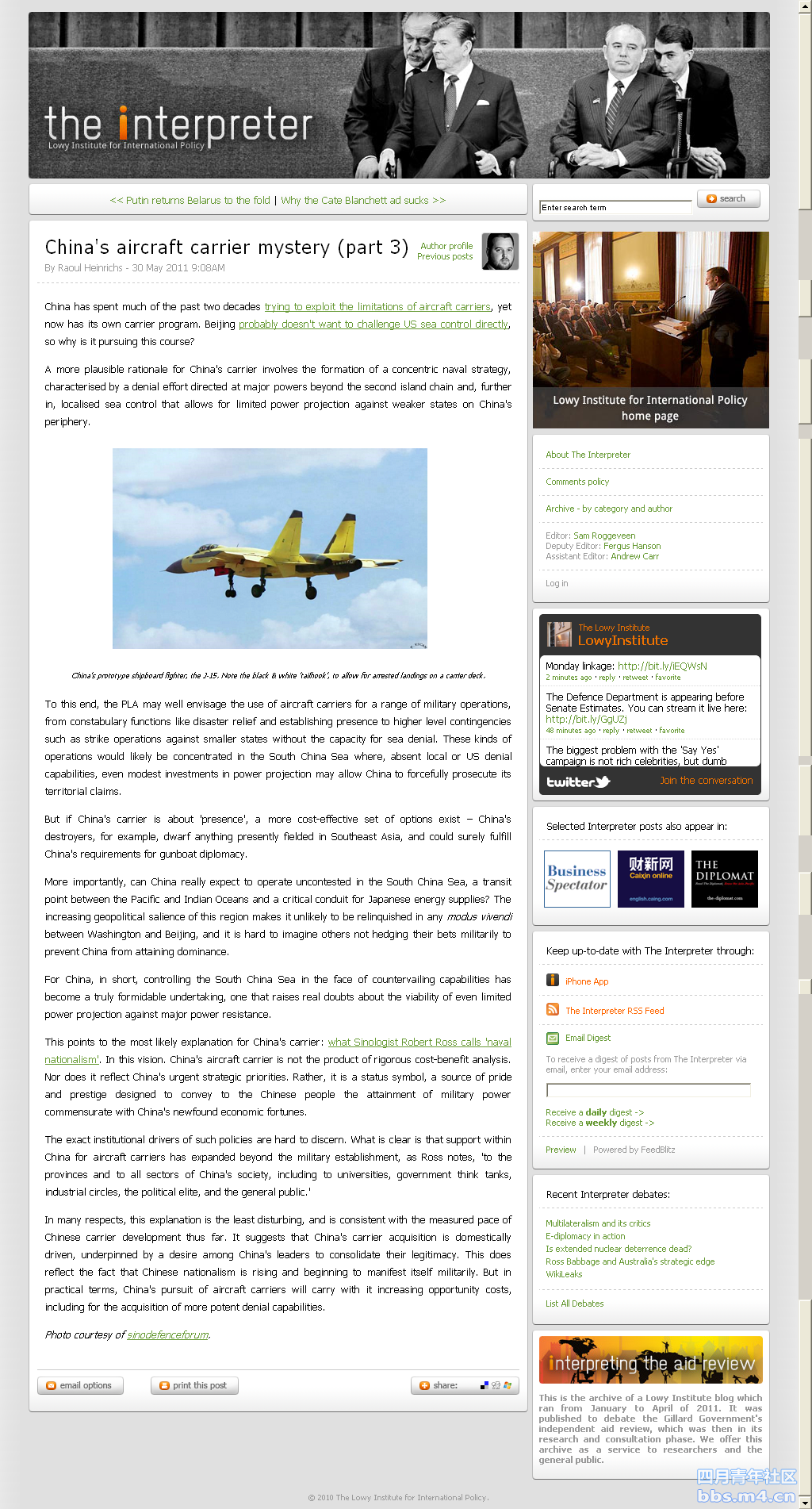|
|
他出答案了,先把原文摆在这里,让看过1,2贴的 看看他的论点成立否?
要不 谁 帮 翻译下?
China's aircraft carrier mystery (part 3)
By Raoul Heinrichs - 30 May 2011 9:08AM
China has spent much of the past two decades trying to exploit the limitations of aircraft carriers, yet now has its own carrier program. Beijing probably doesn't want to challenge US sea control directly, so why is it pursuing this course?
A more plausible rationale for China's carrier involves the formation of a concentric naval strategy, characterised by a denial effort directed at major powers beyond the second island chain and, further in, localised sea control that allows for limited power projection against weaker states on China's periphery.
To this end, the PLA may well envisage the use of aircraft carriers for a range of military operations, from constabulary functions like disaster relief and establishing presence to higher level contingencies such as strike operations against smaller states without the capacity for sea denial. These kinds of operations would likely be concentrated in the South China Sea where, absent local or US denial capabilities, even modest investments in power projection may allow China to forcefully prosecute its territorial claims.
But if China's carrier is about 'presence', a more cost-effective set of options exist – China's destroyers, for example, dwarf anything presently fielded in Southeast Asia, and could surely fulfill China's requirements for gunboat diplomacy.
More importantly, can China really expect to operate uncontested in the South China Sea, a transit point between the Pacific and Indian Oceans and a critical conduit for Japanese energy supplies? The increasing geopolitical salience of this region makes it unlikely to be relinquished in any modus vivendi between Washington and Beijing, and it is hard to imagine others not hedging their bets militarily to prevent China from attaining dominance.
For China, in short, controlling the South China Sea in the face of countervailing capabilities has become a truly formidable undertaking, one that raises real doubts about the viability of even limited power projection against major power resistance.
This points to the most likely explanation for China's carrier: what Sinologist Robert Ross calls 'naval nationalism'. In this vision. China's aircraft carrier is not the product of rigorous cost-benefit analysis. Nor does it reflect China's urgent strategic priorities. Rather, it is a status symbol, a source of pride and prestige designed to convey to the Chinese people the attainment of military power commensurate with China's newfound economic fortunes.
The exact institutional drivers of such policies are hard to discern. What is clear is that support within China for aircraft carriers has expanded beyond the military establishment, as Ross notes, 'to the provinces and to all sectors of China's society, including to universities, government think tanks, industrial circles, the political elite, and the general public.'
In many respects, this explanation is the least disturbing, and is consistent with the measured pace of Chinese carrier development thus far. It suggests that China's carrier acquisition is domestically driven, underpinned by a desire among China's leaders to consolidate their legitimacy. This does reflect the fact that Chinese nationalism is rising and beginning to manifest itself militarily. But in practical terms, China's pursuit of aircraft carriers will carry with it increasing opportunity costs, including for the acquisition of more potent denial capabilities.
http://lowyinterpreter.org/post/ ... stery-(part-3).aspx

|
|